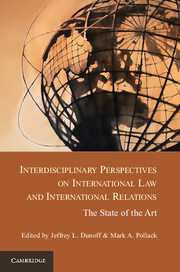 Interdisciplinary Perspectives on International Law and International Relations
Interdisciplinary Perspectives on International Law and International Relations Published online by Cambridge University Press: 05 January 2013
Applied to relations between nations, [the] bureaucratic
politics model directs attention to intra-national games,
the overlap of which constitutes international relations.
Graham Allison (1971: 149)
Within international relations (IR) scholarship, the field of “open economy politics” (Lake 2009) refers to a body of scholarship that has been emerging for the past forty years and that seeks to understand the impact of domestic politics on international politics and the impact of international politics on domestic politics. One foundational premise of this field of study is that domestic politics and law play an important role in causing international political and legal dynamics, and that international political and legal dynamics play an important role in determining domestic politics and law. Thus, an examination of international political and legal dynamics alone would often miss an important part of the picture, and an examination of domestic law and politics alone would also, only somewhat less often, miss an important part of the picture.
The study of international politics and law is less important for an understanding of domestic politics than vice versa simply because of the fact of subsidiarity: international politics and law generally plays a subsidiary role to domestic politics and law. That is, states enter the market of international relations when they can obtain policy outcomes better by doing so than by not doing so. Some actions are best taken domestically, without any international political or legal extension, whereas all international political or legal actions are extensions of some domestic policy. In this sense, as the late Congressman Tip O’Neill suggested, all politics is domestic. However, under globalization, politics is increasingly also global (Drezner 2007). Given the understanding that domestic politics and international politics are significantly interdependent, any study of the relationship between international politics and international law must examine the domestic political and legal dimension.
To save this book to your Kindle, first ensure [email protected] is added to your Approved Personal Document E-mail List under your Personal Document Settings on the Manage Your Content and Devices page of your Amazon account. Then enter the ‘name’ part of your Kindle email address below. Find out more about saving to your Kindle.
Note you can select to save to either the @free.kindle.com or @kindle.com variations. ‘@free.kindle.com’ emails are free but can only be saved to your device when it is connected to wi-fi. ‘@kindle.com’ emails can be delivered even when you are not connected to wi-fi, but note that service fees apply.
Find out more about the Kindle Personal Document Service.
To save content items to your account, please confirm that you agree to abide by our usage policies. If this is the first time you use this feature, you will be asked to authorise Cambridge Core to connect with your account. Find out more about saving content to Dropbox.
To save content items to your account, please confirm that you agree to abide by our usage policies. If this is the first time you use this feature, you will be asked to authorise Cambridge Core to connect with your account. Find out more about saving content to Google Drive.